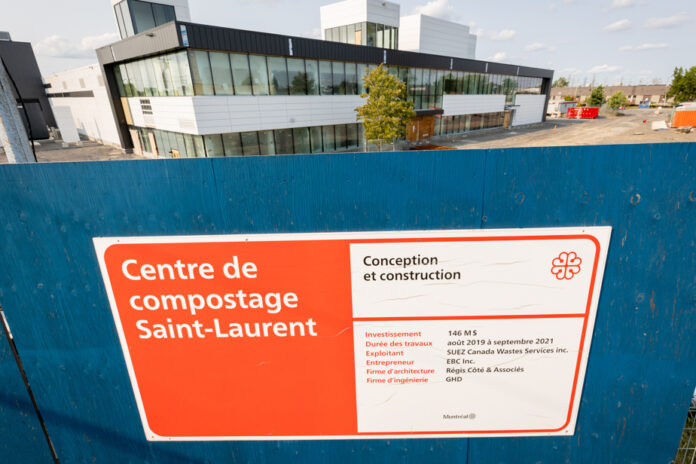Montreal is putting an additional 32 million on the table in the hope that the construction sites of its future compost treatment centers, which have been paralyzed for eight months, will resume.
The administration of Mayor Valérie Plante wants to put an end to this saga, which forces it to export the contents of the brown bins of Montrealers, particularly in Ontario. The official opposition deplores that the City agrees to give in to a company that chooses to paralyze its construction sites.
The executive committee voted on Friday to increase the budgets of the two projects, which already amounted to a total of 340 million. “The next step will be to agree to an agreement with Veolia,” the city says in the documents given to elected officials. Failing which “a dispute is to be apprehended”. The case will be considered by the city council next week.
The EBC contractor had deserted the construction sites of the future Saint-Laurent and Montreal-East treatment centers in July 2022, due to a commercial dispute with the holder of the municipal contract, the company Veolia.
In turn, “Veolia was insistent with the City to claim additional costs without Veolia sufficiently justifying the merits of these costs or providing supporting documents”, indicates the City in its documentation. The company mentioned in particular the consequences of the war in Ukraine or inflation to try to inflate the bill. The City replied that the contracts were fixed and that the City did not have to assume these risks.
“We will not accept being held hostage by a commercial dispute between the company to which we have given a contract and its subcontractors”, declared Marie-Andrée Mauger, the elected official responsible for the environment. within the Plante administration.
On Friday, by voting for a $32 million increase in contingency budgets for the two projects, the City of Montreal opened the door to additional payments to Veolia. However, these must be linked to valid requests.
“Change directives that improve the building, beyond the requirements of the contract”, “work related to storm management” and “change directives that improve process equipment” could in particular be the subject of additional checks , says the municipal document.
“We are entering the final stretch towards the finalization of the agreement, Valérie Plante’s firm said in a written statement. We took steps to resolve the situation and we are proud to have done so. It was the responsible thing to do to finalize the build. »
Veolia “was able to demonstrate to the City solid justifications for the increased costs it must assume to deliver a project that meets industry quality standards. The authorization of these amounts will allow us to complete the negotiation to ensure a rapid resumption of work, “continues the statement, which mentions a direct contact between Valérie Plante and Veolia.
The Official Opposition at City Hall is not so optimistic.
“The City was taken hostage and we are now seeing the effects,” said Saint-Laurent Borough Mayor Alan DeSousa.
According to Mr. DeSousa, this situation creates a “very dangerous precedent” that other suppliers to the City could emulate: cripple your sites and you could obtain additional payments. “It opens the door for other companies to do the same thing,” he said.
“We are pleased with the City’s increase in contingency budgets,” Carrie K. Griffiths, Veolia communications manager, said in an email. Discussions continue […] in order to find a solution acceptable to all parties. »
EBC declined to comment.
The two organic matter treatment center projects have been in the news for years.
The Saint-Laurent facility, located on Henri-Bourassa Boulevard West, was to cost the city $175 million, a sum that includes its operation for the first five years. The construction site is currently 90% complete. The plant should be able to process 50,000 tons of table waste per year to make compost that can be used in agriculture.
The Montréal-Est facility, a biomethanization center, will be located on the site of the former Demix quarry, at the intersection of Avenue Broadway Nord and Highway 40. Its construction and operation for five first years were to cost Montreal $167 million. The facility will swallow 60,000 tons of compost per year, according to the city.
Both projects suffered from significant delays and cost overruns.
The contracts for their construction and operation were awarded in 2019 to Suez, a French company whose North American subsidiary was bought last year by its compatriot Veolia. This explains why the City of Montreal must now deal with Veolia.
In 2021, the Auditor General of Montreal mentioned an “overall finding of cost overruns and non-compliance with the schedule” in the case of organic matter treatment centers (CTMO). “The CTMO construction project did not proceed through a sufficiently rigorous process that one would expect for a project of such complexity and scope,” she wrote.


















